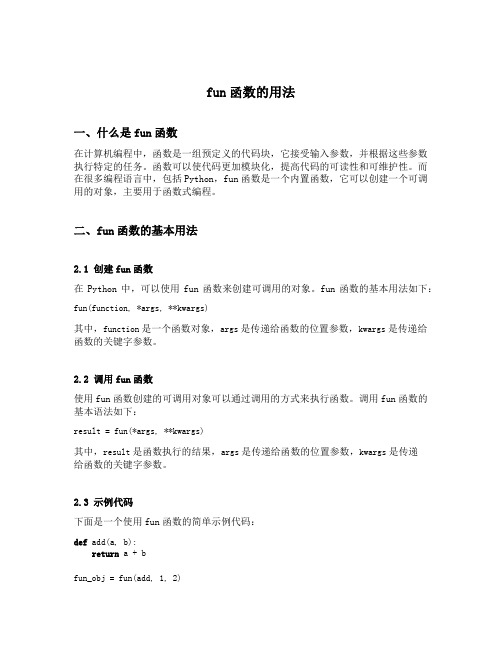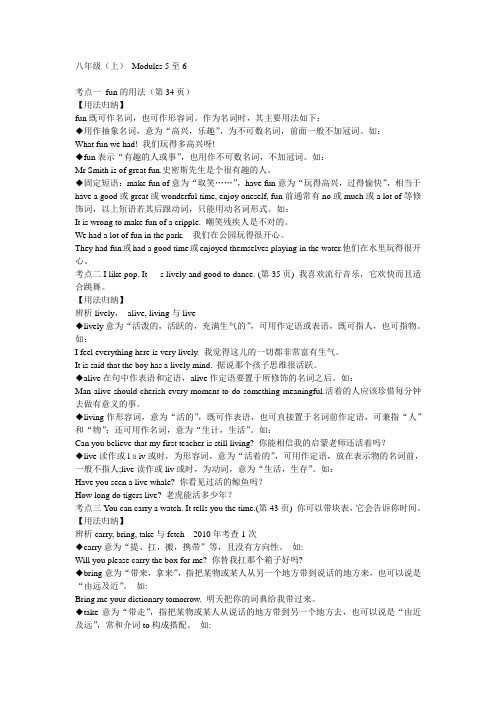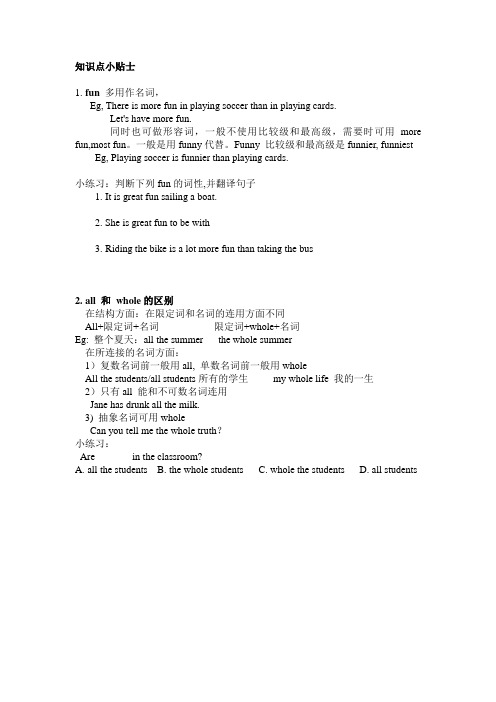fun的用法与搭配
- 格式:pdf
- 大小:38.54 KB
- 文档页数:4

fun函数的用法一、什么是fun函数在计算机编程中,函数是一组预定义的代码块,它接受输入参数,并根据这些参数执行特定的任务。
函数可以使代码更加模块化,提高代码的可读性和可维护性。
而在很多编程语言中,包括Python,fun函数是一个内置函数,它可以创建一个可调用的对象,主要用于函数式编程。
二、fun函数的基本用法2.1 创建fun函数在Python中,可以使用fun函数来创建可调用的对象。
fun函数的基本用法如下:fun(function, *args, **kwargs)其中,function是一个函数对象,args是传递给函数的位置参数,kwargs是传递给函数的关键字参数。
2.2 调用fun函数使用fun函数创建的可调用对象可以通过调用的方式来执行函数。
调用fun函数的基本语法如下:result = fun(*args, **kwargs)其中,result是函数执行的结果,args是传递给函数的位置参数,kwargs是传递给函数的关键字参数。
2.3 示例代码下面是一个使用fun函数的简单示例代码:def add(a, b):return a + bfun_obj = fun(add, 1, 2)result = fun_obj()print(result) # 输出结果为3在这个示例中,我们定义了一个简单的加法函数add,然后使用fun函数创建了一个可调用的对象fun_obj,最后通过调用fun_obj来执行函数并输出结果。
三、fun函数的高级用法除了基本的用法之外,fun函数还支持一些高级的用法,用于函数的组合、部分应用和函数参数的转换等。
3.1 函数的组合使用fun函数可以将多个函数组合成一个新的函数。
这种组合可以使得函数的调用更加简洁和可读。
下面是一个使用fun函数进行函数组合的示例代码:def add(a, b):return a + bdef multiply(a, b):return a * bfun_obj = fun(lambda x: multiply(add(x, 1), 2), 3)result = fun_obj()print(result) # 输出结果为8在这个示例中,我们定义了两个简单的函数add和multiply,然后使用fun函数将它们组合在一起,通过lambda函数定义了一个新的函数,在新的函数中先调用add函数,然后再调用multiply函数,最后将参数3传递给新函数来计算结果。

fun在c语言中的用法
在C语言中,fun是一个函数,用于定义一个用户自定义的函数。
fun的语法如下:
```
return_type fun (argument_type argument_name) {
// 函数体
}
```
其中,return_type表示函数的返回值类型,argument_type表示函数参数的类型,argument_name表示函数参数的名称。
例如,下面是一个计算两个整数之和的函数:
```
int sum(int a, int b) {
return a + b;
}
```
在主函数中调用该函数可以如下:
```
int main() {
int x = 1, y = 2;
int z = sum(x, y);
printf('x + y = %d
', z);
return 0;
}
```
输出结果为:
```
x + y = 3
```
除了定义和调用函数外,我们还可以在函数中调用其他函数,实现更为复杂的功能。
总之,在C语言中,fun是一个非常重要的关键字,用于定义函数,实现程序的模块化和重用。

八年级(上)Modules 5至6考点一fun的用法(第34页)【用法归纳】fun既可作名词,也可作形容词。
作为名词时,其主要用法如下:◆用作抽象名词,意为“高兴,乐趣”,为不可数名词,前面一般不加冠词。
如:What fun we had! 我们玩得多高兴呀!◆fun表示“有趣的人或事”,也用作不可数名词,不加冠词。
如:Mr Smith is of great fun.史密斯先生是个很有趣的人。
◆固定短语:make fun of意为“取笑……”,have fun意为“玩得高兴,过得愉快”,相当于have a good或great或wonderful time, enjoy oneself, fun前通常有no或much或a lot of等修饰词,以上短语若其后跟动词,只能用动名词形式。
如:It is wrong to make fun of a cripple. 嘲笑残疾人是不对的。
We had a lot of fun in the park.我们在公园玩得很开心。
They had fun或had a good time或enjoyed themselves playing in the water.他们在水里玩得很开心。
考点二I like pop. It s lively and good to dance. (第35页) 我喜欢流行音乐,它欢快而且适合跳舞。
【用法归纳】辨析lively,alive, living与live◆lively意为“活泼的,活跃的,充满生气的”,可用作定语或表语,既可指人,也可指物。
如:I feel everything here is very lively. 我觉得这儿的一切都非常富有生气。
It is said that the boy has a lively mind. 据说那个孩子思维很活跃。
◆alive在句中作表语和定语,alive作定语要置于所修饰的名词之后。

fun在python中的用法Python是一种高级编程语言,它的特点是简洁、易读、易学和可扩展性强。
在Python中,fun是一个非常有用的函数,它可以帮助我们处理数据、进行计算等。
一、什么是fun函数fun函数是Python中的一个内置函数,它的作用是对一个序列进行求和操作。
序列可以是列表、元组或集合等。
二、使用fun函数1.基本用法使用fun函数非常简单,只需要在需要求和的序列前加上sum关键字即可。
例如:```a = [1, 2, 3, 4, 5]print(sum(a))```输出结果为:152.指定起始值有时候我们需要对序列进行累加操作,并且需要指定一个起始值。
可以通过在sum函数后面添加第二个参数来实现这个功能。
例如:```a = [1, 2, 3, 4, 5]print(sum(a, 10))```输出结果为:253.浮点数求和如果要对浮点数进行求和操作,则需要使用math库中的fsum函数。
例如:```import matha = [0.1, 0.2, 0.3]print(math.fsum(a))```输出结果为:0.6mbda表达式求和除了使用sum函数外,还可以使用lambda表达式来实现对序列的求和操作。
例如:```a = [1, 2, 3, 4, 5]print((lambda x: sum(x))(a))```输出结果为:15三、应用场景1.计算平均数在实际开发中,我们经常需要对数据进行平均数的计算。
可以通过fun 函数来实现这个功能。
例如:```a = [1, 2, 3, 4, 5]avg = sum(a) / len(a)print(avg)```输出结果为:3.02.统计元素出现次数有时候我们需要统计一个序列中某个元素出现的次数,可以使用fun 函数和列表推导式来实现这个功能。
例如:```a = [1, 2, 3, 4, 5]count = sum([1 for i in a if i == 3])print(count)```输出结果为:13.判断序列是否为空在Python中,空列表、空元组或空集合都被视为False。

interesting和fun的区别interesting和fun的区别:中文意思不同、词性及用法不同。
interesting可作形容词和动词,意思有使感兴趣、使关注、有趣的、有吸引力的;fun可作名词、形容词和动词,意思有享乐、玩笑、使人快乐的、嬉闹等。
一、interesting的中文意思及用法介绍1、interesting作为形容词时,意为有趣的;有吸引力的。
例句:It would be interesting to know what he really believed. 了解他的真实信仰会是很有意思的。
I find it interesting that she claims not to know him.她声称不认识他,我觉得真是耐人寻味。
It was interesting to be in a different environment...到一个全新的环境中是很有意思的。
2、interesting还可作为动词,意为使感兴趣;使关注。
例句:The problems stemming from the discovery also make interesting reading.从这些发现中引出的问题也是能使读者感兴趣的。
Various committee members made interesting points.许多委员提出了使人关注的意见。
二、fun的中文意思及用法介绍1、可作名词,意为享乐;乐趣;快乐;享乐的事;嬉戏;逗乐;玩笑。
例句:We had a lot of fun at Sarah's party.我们在萨拉的聚会上玩得很开心。
She's very lively and full of fun .她很活泼,挺有趣的。
It wasn't serious─it was all done in fun .那不是认真的,全是闹着玩的。

知识点小贴士1.fun 多用作名词,Eg, There is more fun in playing soccer than in playing cards.Let's have more fun.同时也可做形容词,一般不使用比较级和最高级,需要时可用more fun,most fun。
一般是用funny代替。
Funny 比较级和最高级是funnier, funniest Eg, Playing soccer is funnier than playing cards.小练习:判断下列fun的词性,并翻译句子1.It is great fun sailing a boat._______ ______________________________________2. She is great fun to be with_______ _______________________________________3.Riding the bike is a lot more fun than taking the bus_______ ______________________________________2.all 和whole的区别在结构方面:在限定词和名词的连用方面不同All+限定词+名词限定词+whole+名词Eg: 整个夏天:all the summer the whole summer在所连接的名词方面:1)复数名词前一般用all, 单数名词前一般用wholeAll the students/all students所有的学生my whole life 我的一生2)只有all 能和不可数名词连用Jane has drunk all the milk.3) 抽象名词可用wholeCan you tell me the whole truth?小练习:Are _______in the classroom?A.all the studentsB. the whole studentsC. whole the studentsD. all students。
毛额市鹌鹑阳光实验学校高考英语重点词汇复习之三1.fun 用法:Have fun; It is fun to do; What fun it is!特殊注意:fun 是不可数名词,表示乐趣;而funny 则表示滑稽的。
2.furniture 用法:furniture 是不可数名词,谓语动词用单数。
特殊注意:可以用a piece/set of furniture.3.get 用法:get cold; get down to; get away; get close to, get hold of, get in, get off, get on, get rid of, get up特殊注意:作使役动词时,不定式作宾语补足语时to 不能省。
如:Can you get him to pick me up at seven?4.give 用法:give sb. sth. = give sth. to sb. , give away / back / off / out / up / way to , give one’s life to特殊注意:give out 表示“耗尽,用完”是不及物短语。
5.go 用法:go ahead; go all out; go through; go over, go up, go with, go fishing /swimming / hunting特殊注意:作系动词表示变化时,只能表示从好变坏,如:These apples have gone bad.6.good 用法:do good to = do sb. good; it is good of/for sb. to do 特殊注意:在It is no good 的句型中,要用动名词作句子真正的主语。
如:It is no good talking to him.7.graduate 用法:graduate from; a graduate 表示毕业生。
have fun用法1. "Have fun"可以直接用在句子里呀,就像“Let's have fun today!”(我们今天好好玩呀!)想象一下,阳光明媚的一天,大家一起出去玩,喊出这句话,多带劲!2. 哎呀,“We had so much fun at the party last night!”(昨晚在聚会上我们玩得超开心!)你难道不觉得参加一场欢乐的聚会,然后这样表达特别爽吗!3. 你看,“They are always having fun together.”(他们总是在一起玩得很开心。
)就好像是好朋友们整天嘻嘻哈哈,无忧无虑的,多让人羡慕啊!4. “Did you have fun at the concert?”(你在音乐会上玩得开心吗?)这不就是很平常的在关心别人的体验嘛,感觉特别亲切。
5. “I hope you have fun on your trip.”(我希望你在旅途中玩得愉快。
)就像是给要出门的朋友送上美好祝福一样呀。
6. “She really knows how to have fun.”(她真的知道怎么玩得开心。
)是不是脑海中立马浮现出一个很会享受生活、很有趣的人呢?7. “We will have fun no matter what we do.”(不管我们做什么我们都会玩得开心。
)这是一种多乐观的态度呀,干什么都能找到乐趣,多棒啊!8. “He had a lot of fun playing basketball.”(他打篮球玩得很尽兴。
)运动让人快乐呀,大家不都这么觉得嘛!9. “Have fun”就是这样简简单单又实用,能表达出各种快乐的场景和心情呢!结论就是它真的超好用啊!。
①. fun不仅可以作名词(绝大多数情况为名词!),还可以作形容词(其实原本是用名词作定语来用的,后来就用成了形容词了),而且作为形容词仅用于名词前作定语,不能作表语(不能说very fun,funner、funnest等),意义相当于enjoyable,汉语意思是“有趣的;令人愉快的”,例如:Diving is a fun thing to do. 潜水是很有趣的事。
a fun day at a theme park. 在主题公园度过的愉快的一天。
②.funny的意义相对要多:(1) 滑稽的,有趣的,可笑的(2) 稀奇的,古怪的(3) 稍感不适的。
funny不仅可以修饰名词作定语,还可以作表语。
例如:He told funny stories. 他讲了几个有趣的故事It was the funniest thing I ever heard. 这是我所听到过的最有趣的的事。
The machine is making a very funny noise. 这部机器发出一种很奇怪的声音。
The joke is not funny. 那个笑话并不好笑。
Sometimes he is funny, sometimes he seems like a poet. 有时他很滑稽,有时他又像个诗人。
He told the doctor that he felt funny all over. 他告诉医生,他感到浑身不舒服。
③. 如果是修饰人,funny用来指令人发笑的人。
而fun用来指令人愉快的或者喜欢与之相处的人。
例如:She’s one of the funniest people I know. 她是我所认识的最有意思的人之一。
My sister is a fun person. 我妹妹是一个有趣的人。
be great fun的用法
"Be great fun" 是一个英语短语,用来描述某件事情或活动非常有趣或令人愉快。
这个短语常用于口语和书面英语中。
以下是一些示例用法及中文翻译:
1. Going to the amusement park was great fun!去游乐园玩非常有趣!
2. Playing board games with my friends is always great fun.和朋友们玩桌游总是很有趣。
3. Watching the comedy show last night was great fun.昨晚看喜剧节目非常有趣。
4. Building sandcastles at the beach is great fun for kids.在沙滩上筑沙堡对孩子们来说是非常有趣的。
5. Learning how to cook new recipes can be great fun.学习烹饪新菜谱可以非常有趣。
这个短语用来表达对某事物或活动的积极评价,表示它很有趣或令人愉快。
fun的用法与搭配
1. It's fun后接不定式或动名词均可,意思基本相同。
如:
It's great fun sailing a boat.= It's great fun to sail a boat.
扬帆驾舟十分有趣。
2. 表示做某事很开心,可用have (there is) fun (in) doing sth。
如:
We had fun riding our bicycles to the beach today. 我们今天骑自行车去海滨玩得很开心。
There's no fun in spending the evening doing nothing. 晚上无事可干,很无聊。
3. 以下各例中的fun虽用作表语,但仍为名词,而非形容词,故可用great, much, a lot of等形容词修饰,而不用very等副词修饰。
如:
She's great fun to be with. 同她在一起很有意思。
Why don't you come with us? It'll be great fun. 干吗不同我们一起去呢?很有趣的。
下面一例中fun前的more为much的比较级。
如:
It is more fun to go with someone than to go alone. 偕伴同去比自己独自去好玩。
4. 注意for fun(为了高兴,为了好玩)与in fun(不是当真的,闹着玩的,开玩笑地)意不同。
比较:
I am not saying it for fun. 我说这话并不是在开玩笑。
He said so only in fun. 他这样说只是开开玩笑。
as follows 的用法及句法功能
作者: admin来源: 网络文章时间: 2019-04-16
主要用于介绍或列举事项,意为“如下”,其中的follows必须带有词尾–s,在句子可以用作以下成分:
1. 用作表语。
如:
My main objections fire as follows: First of all no proper
budget has been drawn up. Secondly, there is no guarantee
that... 我主要的反对意见如下:首先,没有制订适当的预算;其次,没
有保证……
The main events were as follows: first, the president's
speech, secondly the secretary's reply and thirdly, the
chairman's summing-up. 主要活动如下:第1项,总裁讲话;第2项,秘书做解答;第3项,主席做总结。
2. 用作状语。
如:
Just before the battle the general addressed his army as
follows. 就在战斗打响之前,将军对部队讲了下面这番话。
Expenditure on the project breaks down as follows: wages
10m, plant 4m, raw materials 5m. 该工程费用开支可分成如下几部分:工资1,000万英镑,厂房设备400万英镑,原料500万英镑。
比较下面的同义句:
His explanation is as follows.=He explains it as follows. 他的解释如下。
the fact that的语法功能
作者: admin来源: 网络文章时间: 2019-03-18
一、用于引导主语从句
在许多情况下,当语义上需要用一个较复杂的that从句用主语时,若直接将其置于句首位置,则会显得“头轻脚重”。
这时,我们通常采用的办
法便是使用形式主语it来改变句子结构。
如:
That he had no girl friends worried his parents a lot.= It
worried his parents a lot that he had no girl friends. 他没有女朋友,这件事使他父母非常不安。
That he has fully recovered makes me feel good.=It makes
me feel good that he has fully recovered. 他已痊愈,真令我高兴。
That he had not said anything surprised everybody.=It
surprised everybody that he had not said anything. 他一言不发,这使大家很吃惊。
在比较正式的文体中,有时也可借助the fact这一辅助手段,按以下方式改写句子:
The fact that he had no girl friends worried his parents a lot.
The fact that he has fully recovered makes me feel good.
The fact that he had not said anything surprised everybody.
二、用于介词后引导宾语从句
按英语习惯,介词后面通常不能直接跟一个that从句作宾语,遇此情况,人们通常在that从句前使用the fact。
这样一来,就变成了the fact 用作介词的宾语,而其后的that从句则成了the fact的同位语从句。
如:
They were worried over the fact that you were sick. 他们为你生病发愁。
I didn't go out because of the fact that it was raining. 因为在下雨,所以我没出去。
Were it not for the fact that you helped me, I would be
homeless. 若非你的帮助,我仍会无家可归。
He must face up to the fact that he is no longer young. 他必须勇于正视自己不再年轻这一事实。
It's time you woke up to the fact that you're not very popular.
你早就该明白你不怎么受欢迎了。
The judge paid a lot of attention to the fact that the child
was unhappy at home. 法官非常注意这一情况,即孩子在家里并不快乐。
He said the parents were responsible for the fact that the
child had run away. 他说孩子父母应对孩子逃跑一事负责。
注:英语中只有极个别介词(如except等)可直接跟that从句。
如:
The two books are the same except that this one has an
answer key at the back. 除了这本书后面有问题答案以外, 这两本书
完全一样。
三、用于动词后引导宾语从句
英语中有的动词虽为及物动词,可接名词或代词作宾语,但通常不接that从句作宾语。
若语义上需要接一个that从句,则可借助the fact结构。
如:
I dislike the fact that he smokes. 我厌恶他吸烟。
No one can deny the fact that fire burns. 无人能否认火能燃烧
的事实。
You can't escape the fact that she has got married three
times. 她结过三次婚,这个事实你是不能逃避的。
We must face the fact that we might lose our deposit. 我们必须正视我们可能失去存款这一事实。
I admired the fact that he would talk to students outside the
classroom or talk with them on the telephone. 我羡慕他经常在课外与学生聊天或通过电话与学生聊天。